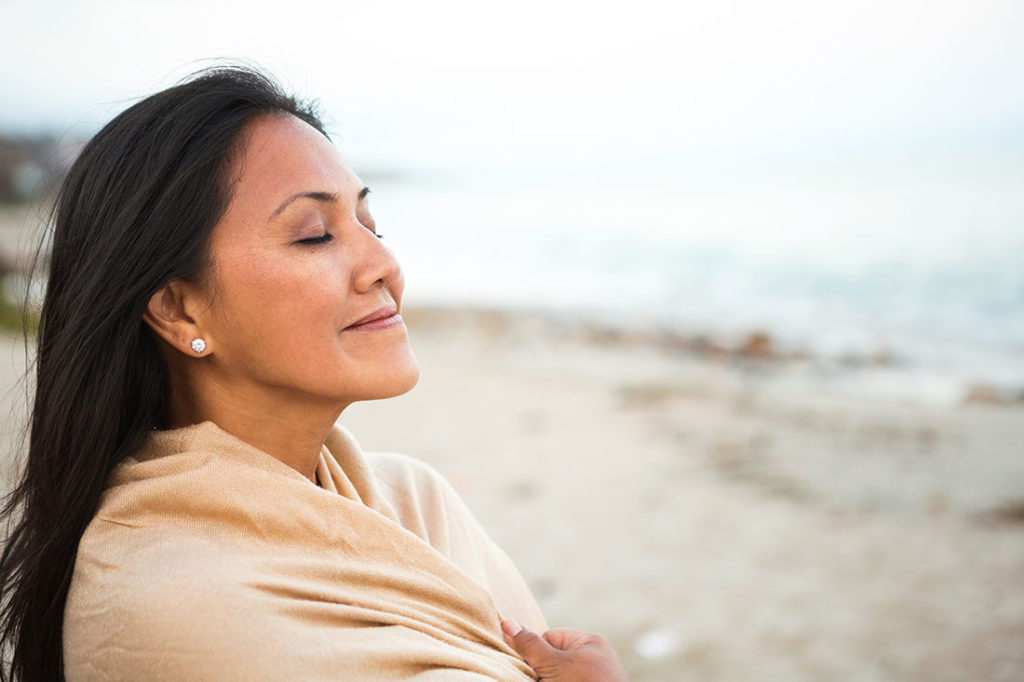As I stumbled out of bed, I tried to count how many drinks I had the night before.
Was it two glasses of wine or three? Did I add two shots of tequila or three to that margarita? What else did I drink?
I was hungover and embarrassed. Not only was it a Tuesday morning, I had gotten drunk without even leaving the house.
This was around six months into the pandemic. Six months of working from home, not being able to see friends—not being able to do a lot of things.
Until then, I thought I had coped well with being home alone. I didn’t feel like I needed to drink alcohol. It was just something to do.
But as the pandemic wore on, with no end in sight, I began to realize I needed to change, or at least find better, healthier ways to deal with being stuck at home. I challenged myself to go without alcohol and to instead unwind with yoga for 30 days.
It was also around this time that a friend introduced a new concept to me—ikigai. It’s a Japanese word with no exact translation in English. If you combine iki, which means “life” or “being alive,” with the word gai, which means “what is worthwhile and has value,” you get something that translates to “that which makes life worth living,” according to Héctor García and Francesc Miralles, the authors of two books on the subject.
I wondered: Over the past six months, had that which made my life worth living become booze? I started flipping through the latest book by García and Miralles, The IKIGAI Journey, in search of something more.
The Ikigai
A few years ago, García and Miralles traveled to a Tokyo park known as “the village of centenarians,” home to those with the world’s longest life expectancy. They interviewed the area’s oldest residents to learn the secrets of living a long, happy life.
From that research, they outlined four components to ikigai—passion, mission, profession and vocation. These four elements overlap across different aspects of life. Passion and profession, for example, overlap at your talents. Profession and vocation overlap at what can get you paid. Vocation and mission cross at what the world needs. And mission and passion intersect at what you love.
Our world, according to García and Miralles, tends to focus on the intersection of profession and vocation. That makes sense, considering getting paid is how we’re able to pay our bills and make a living.
“However, if we do not take the other component of the ikigai… into account, and only focus on continuously earning money, our entire life can become empty of meaning,” García and Miralles write.
As a single guy, I was locked away alone in quarantine with the rest of the world, and I realized that without the usual diversions—going to the movies, sporting events or on vacation—I was really only focused on working Monday through Friday, and I wasn’t feeling fulfilled.
No wonder you’ve been drinking so much, I thought to myself. My life had been empty, and I filled the void with liquid. I realized I needed to find new ways to stay fulfilled.
The Stations
In their book, García and Miralles take readers through 35 “stations” aimed at helping people find their ikigai. These include purposeful activities such as carrying out an altruistic act of kindness each day, as well as philosophical states to be achieved, such as allowing yourself “to be carried along by the serendipitous and other coincidence of your life.”
You don’t need to go through all of the stations to find your ikigai. But the goal is that in trying at least some of them, you find some sort of fulfillment and life worth living.
As I read García and Miralles’s book, there was one station that immediately stuck out to me—the fourth station, on spending time developing positive new habits. They ask readers to think about what habits govern their lives, which ones make them feel good, and which ones are harmful or drain energy.
“It is said that humans are ‘creatures of habit,’ and it is true that habits are essential for our survival, since they are mechanisms that help us automatize tasks without constantly having to make decisions,” García and Miralles write. “If we had to think about every single move we make during the day, we could end up exhausted.”
If there’s one thing I’m known for among my friends, it’s being a creature of habit. I tend to eat at the same restaurants, order the same things, and set a similar schedule for myself every week. It makes life easier, but it’s also a comfort blanket of sorts. Pre-pandemic, most of my habits were healthy: I caught a weekly movie with a co-worker on Thursdays; I had dinner with my family on the weekend. But during the pandemic, without being able to do the healthy ones, I was sticking mostly to the bad habits.
García and Miralles suggest replacing bad habits with good ones, and I was doing that by swapping drinking for yoga. But I wanted to go deeper. I thought about how my drinking had spiraled in the first place.
It began after I started a new, more stressful job. My way to deal with that was to come home and have a glass of wine. Just one. But as the job became even more taxing, one glass turned into two, and two turned into more, plus some whiskey mixed in as well. I realized that soon I wasn’t drinking to unwind, but because I thought it helped me sleep. So I replaced my nightly glass of wine with a nightly cup of bedtime tea.
Not only did it work, but it was satisfying. I had something I could slowly sip while reading a book or watching Netflix, which helped me fall asleep at the same time.
In replacing my after-work beer with yoga, I felt another sense of accomplishment. You don’t feel like you achieved something after having a pint of beer. But with yoga in the evenings, I felt a sense of pride when I was done. Some days, that’s because I got deeper into a certain pose than the day before. Other days, it was just because I made it a point to show up on the mat, even if I didn’t feel like it.
I followed a 30-day guide I found on YouTube created by Adriene Mishler. Her “Yoga with Adriene” videos have garnered tens of millions of views. They are easy to follow, and each lesson includes a goal—something to focus on like breath, balance, thoughts, and so on.
I felt stronger. Not just physically from the yoga, but also mentally. A week in, I was proud of myself for being able to still have fun on Zoom happy hours with a non-alcoholic beer in hand. I felt myself able to handle these two challenges, and started adopting more keys to finding my ikigai.
The 19th station toward finding your ikigai is to go analog: Establish a screen-free timeslot in each day. So every night before bed, I decided to start reading for an hour, uninterrupted by my phone or TV.
I also went a step further. I decided to start cutting down my screen time overall. Before the pandemic, my screen time report was normal, but during the pandemic, as nights of doom scrolling grew longer and longer, my screen time doubled.
I started setting reminders on my phone to spend more time away from my screens, and with them all of the bickering and bad news of Facebook and Twitter. After a week, the habit became normalized. My weekly screen time dropped by 15 percent, then 25 percent, then 33 percent. Not only was I spending less time on my phone, I was being more present, too. Nights normally spent “watching” a basketball game while scrolling through my phone were now moments when I actually took time to appreciate an athlete’s skill or a coach’s vision.
The Foundation
As my 30 days came to an end, I realized the changes that had occurred in me both physically and mentally.
I was more present. I was stronger, more flexible and able to breathe deeper. My blood pressure dropped. Had I found my ikigai? I’m not sure, but I was definitely living a more fulfilled life. It made me question whether I felt unfulfilled even before the pandemic, and if it took six months of quarantine for me to realize it.
“We can spend days, months and years wrapped up in our routines, ensnared by our mundane responsibilities,” García and Miralles write. “However, as time goes by, we will ask ourselves if we are really living our lives or just getting by to meet other people’s expectations.”
Either way, I was thankful for these new things I had achieved.
A few months have passed. As I write, we are still in a pandemic. I don’t do yoga every day, and I still drink, but not nearly as much. I’ve invested in other hobbies such as puzzles, tennis and going for long walks. These are healthy activities that keep me busy and make me feel fulfilled. In some ways they’re the building blocks to staying happy. And while I know every day won’t be cheery, at least I have the foundation to keep me going.
For me it’s this foundation that makes life worth living.“You are going to build the compass which will help you travel in step with your ikigai,” write García and Miralles. “In [the] future, whenever you find yourself feeling lost, you can always come back to it to get back on course.”
This article originally appeared in the May/June 2021 issue of SUCCESS magazine.










